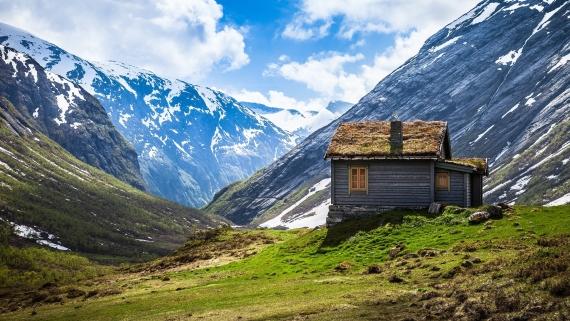Buy to Rent Land Opportunities - What Are They?
Posted: January 20, 2016 by LandCentury

Buy to rent land opportunities are a great way to increase your investment portfolio, and do so without the large upfront expenditure of buying or building a home. We all know or have heard stories of people that purchase a home to rent it. Right? This is the same opportunity, but with land.
Buy to Rent Land: Whats the Best Option?
When you consider purchasing a property, you need to make sure that it does have some intrinsic value to it. There must be a reason for a person to rent your land. Of course, if you own a small lot of land in the middle of a city, you wouldnt expect this land to be able to be used for timber or farmland. It's simply too small of a lot to do anything aside from possibly building a home and renting it.
Yes, there may be certain circumstances where a community may rent your land and transform it into a park or use it for the community garden, but this is not something that I would entertain as a viable investment option.
Instead, you want to be looking for a few different land types:
Farmland Rental
Cornell University released a very interesting publication related to renting farmland. In the publication, it suggests that half of all the farmland, consisting of millions of acres, is rented to farmers. There are landowners that own millions of acres, and these are often large investment firms or billionaires that have purchased the land. Chances are, youve passed many farmers who are currently renting the land.
Rental prices, according to this publication, indicate that farmland rentals can be free, in the case of government rentals, or it may range up to $100 per acre. This all depends on a variety of factors:
* Land quality and potential
* Amount of land rented
* Current market prices
The publication goes to say that you want to determine the expenses of the land by acre. If you had a piece of property that was worth $1,000 per acre, you can assume that it will cost 4% - 5% to maintain the land. This will be expenditures that include maintaining the land and property taxes. In essence, youll have financial obligations, pertaining to the land itself, of $40-$50 per acre.
Basing your rental off of this assumption, youll also add 2% to 5% for your own return on investment. This is the money that you will make from the land after deducting all of your expenditures. Its best to discuss the going rate with your local farm advisors or cooperative extension agents that are more versed in your local farmland rentals. Top farmland with great soil normally rents for $10-$45 an acre, but this can vary depending on the state.
Hunting Land Rental
Hunting land rentals are becoming less popular. Many landowners are happy to allow hunters onto their land to take care of an ever-growing population of animals. This is especially true for farmers that have an abundance of land, and have coyotes or deer ruining their crops or killing their animals. But if you do on a large plot of land and hunting is allowed, you may build to make a decent income off of renting the land.
Weve been able to dig up a few hunting land prices:
* A 77-acre property is currently being leased for hunting at $500 a month in North Carolina.
* A 17-acre lot is currently renting for $700 a year at a cost of $40 per acre.
* An enormous 235-acre lot in Florida is renting for $100 per acre, per month. If you chose to rent this entire lot, it would cost $23,500 per month. And this can be divided into 10 acre lots.
This is the perfect opportunity for an investor. If you dont have the capital to build a home or another structure on the property, you can simply pay the bills or maintenance of the land, and earn a small income off of renting. In the very least, youll make some money in return and be able to stay current on your property taxes while the land price appreciates. Its the perfect opportunity for anyone that wants to invest in land, and it does provide an immediate source of income that would otherwise be unavailable.
Building a Home to Rent or Renting Raw Land
In most cases, its better to build a home on the property and rent it. There are exceptions obviously, but this will provide you with not only a home that appreciates in value, but also immediate income that is much higher.
A real estate portfolio is never a bad idea, but it is also far more expensive to build a home and simply rent the land.
The main difference renting a home and renting land is that a real estate agent will be able to help you rent the property or sell it when you need to. With land, its much harder to find someone to rent the property, and youll need to take a more hands-on approach. But the widespread number of farmers that are renting land rather than owning it should give you an indication that the process is not that difficult. If done right, renting land requires a much smaller investment than buying a house, and can provide substantial income for the future.
You also have other options when buying land to rent. You can rent the land out as timberland and receive an income monthly, or a bulk payment based on the percentage of the timber sold. Waterfront land can also be rented for fishing, and virtually any land can be rented for an income.
Always check out the going rates in your area for these types of rentals, and know that the land will appreciate in value and act as a long-term investment. Think of the rental income as just another added bonus of owning land.
Buy to Rent Land: Whats the Best Option?
When you consider purchasing a property, you need to make sure that it does have some intrinsic value to it. There must be a reason for a person to rent your land. Of course, if you own a small lot of land in the middle of a city, you wouldnt expect this land to be able to be used for timber or farmland. It's simply too small of a lot to do anything aside from possibly building a home and renting it.
Yes, there may be certain circumstances where a community may rent your land and transform it into a park or use it for the community garden, but this is not something that I would entertain as a viable investment option.
Instead, you want to be looking for a few different land types:
Farmland Rental
Cornell University released a very interesting publication related to renting farmland. In the publication, it suggests that half of all the farmland, consisting of millions of acres, is rented to farmers. There are landowners that own millions of acres, and these are often large investment firms or billionaires that have purchased the land. Chances are, youve passed many farmers who are currently renting the land.
Rental prices, according to this publication, indicate that farmland rentals can be free, in the case of government rentals, or it may range up to $100 per acre. This all depends on a variety of factors:
* Land quality and potential
* Amount of land rented
* Current market prices
The publication goes to say that you want to determine the expenses of the land by acre. If you had a piece of property that was worth $1,000 per acre, you can assume that it will cost 4% - 5% to maintain the land. This will be expenditures that include maintaining the land and property taxes. In essence, youll have financial obligations, pertaining to the land itself, of $40-$50 per acre.
Basing your rental off of this assumption, youll also add 2% to 5% for your own return on investment. This is the money that you will make from the land after deducting all of your expenditures. Its best to discuss the going rate with your local farm advisors or cooperative extension agents that are more versed in your local farmland rentals. Top farmland with great soil normally rents for $10-$45 an acre, but this can vary depending on the state.
Hunting Land Rental
Hunting land rentals are becoming less popular. Many landowners are happy to allow hunters onto their land to take care of an ever-growing population of animals. This is especially true for farmers that have an abundance of land, and have coyotes or deer ruining their crops or killing their animals. But if you do on a large plot of land and hunting is allowed, you may build to make a decent income off of renting the land.
Weve been able to dig up a few hunting land prices:
* A 77-acre property is currently being leased for hunting at $500 a month in North Carolina.
* A 17-acre lot is currently renting for $700 a year at a cost of $40 per acre.
* An enormous 235-acre lot in Florida is renting for $100 per acre, per month. If you chose to rent this entire lot, it would cost $23,500 per month. And this can be divided into 10 acre lots.
This is the perfect opportunity for an investor. If you dont have the capital to build a home or another structure on the property, you can simply pay the bills or maintenance of the land, and earn a small income off of renting. In the very least, youll make some money in return and be able to stay current on your property taxes while the land price appreciates. Its the perfect opportunity for anyone that wants to invest in land, and it does provide an immediate source of income that would otherwise be unavailable.
Building a Home to Rent or Renting Raw Land
In most cases, its better to build a home on the property and rent it. There are exceptions obviously, but this will provide you with not only a home that appreciates in value, but also immediate income that is much higher.
A real estate portfolio is never a bad idea, but it is also far more expensive to build a home and simply rent the land.
The main difference renting a home and renting land is that a real estate agent will be able to help you rent the property or sell it when you need to. With land, its much harder to find someone to rent the property, and youll need to take a more hands-on approach. But the widespread number of farmers that are renting land rather than owning it should give you an indication that the process is not that difficult. If done right, renting land requires a much smaller investment than buying a house, and can provide substantial income for the future.
You also have other options when buying land to rent. You can rent the land out as timberland and receive an income monthly, or a bulk payment based on the percentage of the timber sold. Waterfront land can also be rented for fishing, and virtually any land can be rented for an income.
Always check out the going rates in your area for these types of rentals, and know that the land will appreciate in value and act as a long-term investment. Think of the rental income as just another added bonus of owning land.




